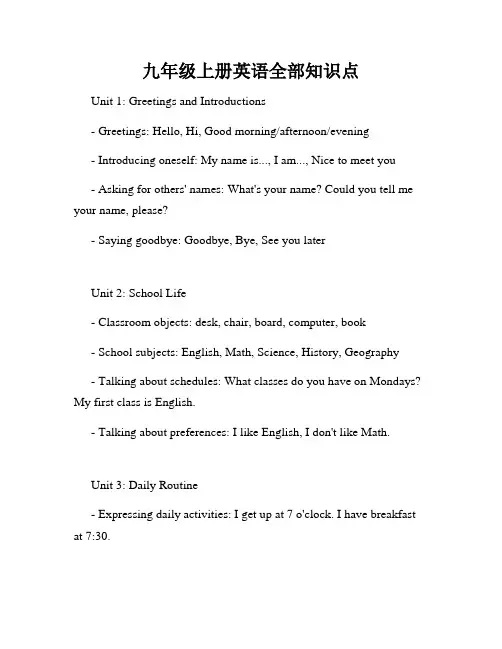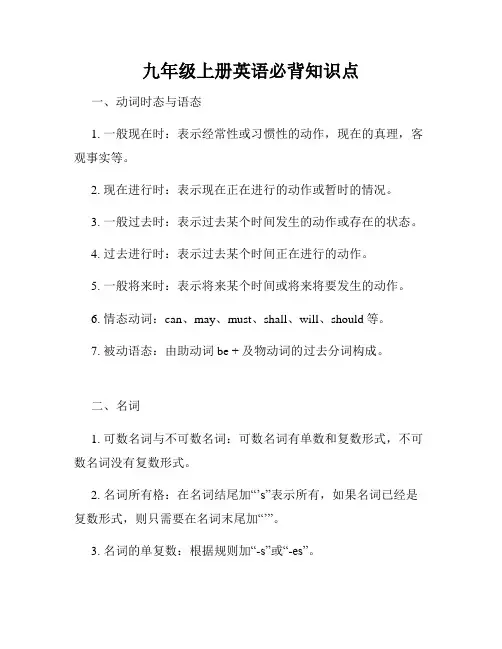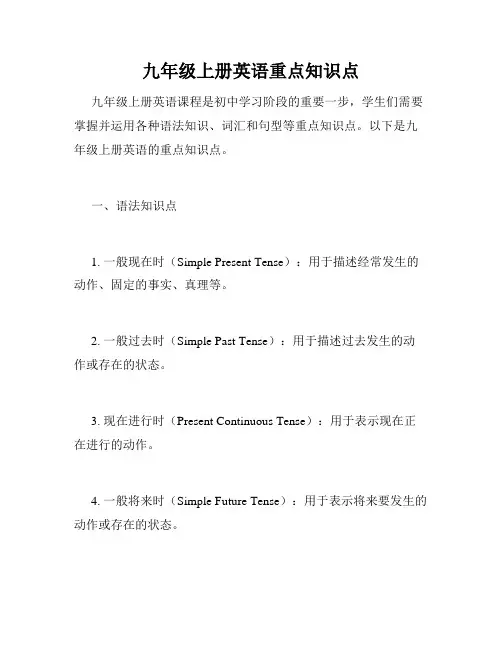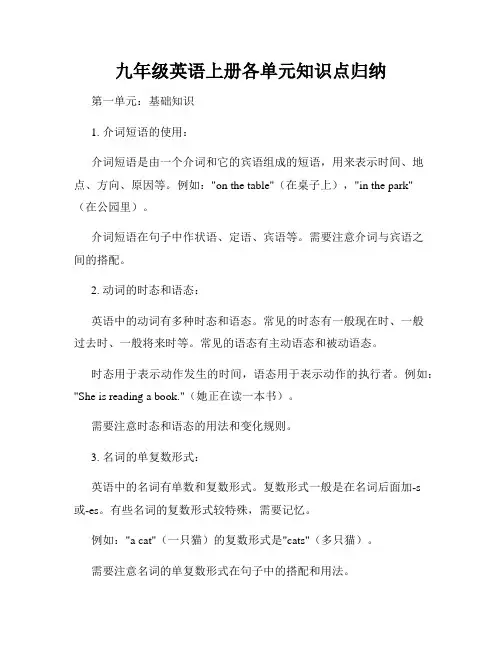初三上学期英语知识点
九年级上册英语全部知识点

九年级上册英语全部知识点Unit 1: Greetings and Introductions- Greetings: Hello, Hi, Good morning/afternoon/evening- Introducing oneself: My name is..., I am..., Nice to meet you- Asking for others' names: What's your name? Could you tell me your name, please?- Saying goodbye: Goodbye, Bye, See you laterUnit 2: School Life- Classroom objects: desk, chair, board, computer, book- School subjects: English, Math, Science, History, Geography- Talking about schedules: What classes do you have on Mondays? My first class is English.- Talking about preferences: I like English, I don't like Math.Unit 3: Daily Routine- Expressing daily activities: I get up at 7 o'clock. I have breakfast at 7:30.- Using time expressions: in the morning, in the afternoon, in the evening- Talking about frequency: I usually brush my teeth twice a day.Unit 4: Hobbies and Interests- Talking about hobbies: I like playing soccer, drawing, reading books.- Expressing preferences: I prefer playing video games to watching TV.- Inviting others: Do you want to play basketball with me?Unit 5: Family and Friends- Talking about family members: I have a brother and a sister. My mother is a teacher.- Describing physical appearance: My brother has short black hair and blue eyes.- Talking about relationships: She is my best friend. He is my cousin.Unit 6: Food and Health- Describing food: I like pizza with cheese and vegetables.- Talking about healthy habits: It's important to eat fruits and vegetables.- Expressing opinions: I think fast food is not good for our health.Unit 7: Travel and Holidays- Talking about vacation plans: I want to visit Paris during the summer vacation.- Asking for directions: Excuse me, could you tell me how to get to the train station?- Talking about past travels: Last year, I went to the beach with my family.Unit 8: Around the World- Talking about different countries: China, Italy, Australia, Japan- Describing famous landmarks: The Great Wall of China, The Colosseum, The Sydney Opera House- Comparing cultures: In China, people eat with chopsticks. In Italy, they eat pasta.Unit 9: Environmental Issues- Talking about environmental problems: pollution, deforestation, global warming- Expressing concerns: We need to recycle and reduce waste.- Talking about actions: We can use public transport instead of driving.Unit 10: Future Plans- Talking about future careers: I want to be a doctor and help people.- Expressing ambitions: I hope to travel around the world one day.- Talking about future plans: After graduation, I want to go to university.以上是九年级上册英语的全部知识点。
九年级上册英语知识点归纳总结

九年级上册英语知识点归纳总结九年级上册英语是初中阶段的最后一年,学生们在这个阶段将进一步提高他们的英语水平,为高中英语的学习做好准备。
本文将对九年级上册英语的知识点进行归纳总结,希望能够帮助学生们更好地掌握这些知识。
一、语法知识点1. 一般现在时- 肯定句:主语+动词原形+其他- 否定句:主语+do not/does not+动词原形+其他- 疑问句:Do/Does+主语+动词原形+其他?2. 一般过去时- 肯定句:主语+动词过去式+其他- 否定句:主语+did not+动词原形+其他- 疑问句:Did+主语+动词原形+其他?3. 现在进行时- 肯定句:主语+am/is/are+动词-ing+其他- 否定句:主语+am not/is not/are not+动词-ing+其他- 疑问句:Am/Is/Are+主语+动词-ing+其他?4. 宾语从句宾语从句通常由连词that, whether, if引导。
例如:He says that he is busy.(他说他很忙。
)5. 接续动词接续动词用来连接两个句子或者短语,常见的接续动词有and, but, or, so, because等。
例如:I like swimming and playing basketball.(我喜欢游泳和打篮球。
)二、词汇知识点1. 单词拼写通过九年级上册的学习,学生们需要掌握大量的新词汇,要注意正确拼写这些单词。
可以通过多做单词拼写练习来提高拼写水平。
2. 同义词和反义词学生们需要学会使用一些同义词和反义词来丰富他们的词汇量和表达能力。
例如:big和large, hot和warm等。
3. 短语和固定搭配学生们需要掌握一些常用的短语和固定搭配,以便更加自然地表达自己的意思。
例如:in the end(最后),take care of(照顾),as soon as(一...就...)等。
三、阅读理解学生们需要培养良好的阅读习惯,提高他们的阅读理解能力。
九年级上册英语必背知识点

九年级上册英语必背知识点一、动词时态与语态1. 一般现在时:表示经常性或习惯性的动作,现在的真理,客观事实等。
2. 现在进行时:表示现在正在进行的动作或暂时的情况。
3. 一般过去时:表示过去某个时间发生的动作或存在的状态。
4. 过去进行时:表示过去某个时间正在进行的动作。
5. 一般将来时:表示将来某个时间或将来将要发生的动作。
6. 情态动词:can、may、must、shall、will、should等。
7. 被动语态:由助动词be + 及物动词的过去分词构成。
二、名词1. 可数名词与不可数名词:可数名词有单数和复数形式,不可数名词没有复数形式。
2. 名词所有格:在名词结尾加“’s”表示所有,如果名词已经是复数形式,则只需要在名词末尾加“’”。
3. 名词的单复数:根据规则加“-s”或“-es”。
1. 人称代词:I、you、he、she、it、we、they等。
2. 物主代词:mine、yours、his、hers、its、ours、theirs等。
3. 反身代词:myself、yourself、himself、herself、itself、ourselves、yourselves、themselves等。
4. 指示代词:this、that、these、those等。
5. 疑问代词:who、whose、whom、what、which等。
6. 关系代词:that、which、who、whom、whose等。
四、形容词与副词1. 形容词的用法:修饰名词时放在名词前面,修饰不定代词时放在后面。
2. 形容词比较级与最高级:一般在形容词后面加“-er”表示比较级,加“-est”表示最高级。
3. 形容词的位置:一般在连系动词后面作表语,也可用于作定语或宾补。
4. 副词的用法:修饰动词、形容词或其他副词。
1. 地点介词:in、on、at、under、over、below、above等。
2. 时间介词:in、on、at、before、after、during等。
九年级英语上册单元重要知识点总结

九年级英语上册单元重要知识点总结九年级英语上册共有8个单元,包括Unit 1 My New Teachers、Unit 2 How Often Do You Exercise、Unit 3 I'm more outgoing than my sister、Unit 4 Don't eat in class、Unit 5 What are the shirts made of、Unit 6 I'm going to study computer science、Unit 7 Would you mind turning down themusic、Unit 8 How do you make a banana milk shake?下面对每个单元的重要知识点进行总结:Unit 1 My New Teachers1.介绍自己和他人的基本信息,包括姓名、年龄、学校、家庭成员等。
2.学习询问他人的基本信息,如What's his/her name? How old is he/she?Which school does he/she go to?等。
3.学习询问他人的职业和爱好,如What does he/she do? What are his/herhobbies?等。
4.学习表达个人的职业和爱好,如I'm a student. My hobbies are playingbasketball and listening to music.等。
Unit 2 How Often Do You Exercise1.学习询问他人的日常活动频率,如How often do you exercise? Howoften does he/she watch TV?等。
2.学习回答关于日常活动频率的问题,如I exercise three times a week.He/She watches TV every day.等。
九年级上册英语重点知识点

九年级上册英语重点知识点九年级上册英语课程是初中学习阶段的重要一步,学生们需要掌握并运用各种语法知识、词汇和句型等重点知识点。
以下是九年级上册英语的重点知识点。
一、语法知识点1. 一般现在时(Simple Present Tense):用于描述经常发生的动作、固定的事实、真理等。
2. 一般过去时(Simple Past Tense):用于描述过去发生的动作或存在的状态。
3. 现在进行时(Present Continuous Tense):用于表示现在正在进行的动作。
4. 一般将来时(Simple Future Tense):用于表示将来要发生的动作或存在的状态。
5. 一般过去进行时(Past Continuous Tense):用于表示过去某个时间点正在进行的动作。
6. 情态动词(Modal Verbs):包括can、could、may、might、shall、should、will、would、must等,用于表达能力、允许、推测、义务等。
7. 定语从句(Adjective Clause):用于修饰名词或代词的从句。
8. 倒装句(Inversion):将助动词或情态动词提到主语之前的句子结构。
9. 宾语从句(Object Clause):用于作宾语的从句。
10. 虚拟语气(Subjunctive Mood):用于表示假设、愿望、建议等。
二、词汇知识点1. 动词短语(Phrasal Verbs):由动词和副词/介词组成的短语,常用于口语和日常交流中。
2. 介词短语(Prepositional Phrases):由介词和名词短语组成的短语,用于表示时间、地点、方式等。
3. 同义词(Synonyms):意义相同或相近的词语,用于扩展词汇量。
4. 反义词(Antonyms):意义相反的词语,用于对比和理解词义。
5. 词根词缀(Word Roots and Affixes):理解词根和词缀的含义,有助于推测词义。
九年级英语上册各单元知识点归纳

九年级英语上册各单元知识点归纳第一单元:基础知识1. 介词短语的使用:介词短语是由一个介词和它的宾语组成的短语,用来表示时间、地点、方向、原因等。
例如:"on the table"(在桌子上),"in the park"(在公园里)。
介词短语在句子中作状语、定语、宾语等。
需要注意介词与宾语之间的搭配。
2. 动词的时态和语态:英语中的动词有多种时态和语态。
常见的时态有一般现在时、一般过去时、一般将来时等。
常见的语态有主动语态和被动语态。
时态用于表示动作发生的时间,语态用于表示动作的执行者。
例如:"She is reading a book."(她正在读一本书)。
需要注意时态和语态的用法和变化规则。
3. 名词的单复数形式:英语中的名词有单数和复数形式。
复数形式一般是在名词后面加-s或-es。
有些名词的复数形式较特殊,需要记忆。
例如:"a cat"(一只猫)的复数形式是"cats"(多只猫)。
需要注意名词的单复数形式在句子中的搭配和用法。
第二单元:阅读理解1. 完型填空:完型填空是一种考察学生对语境理解和词汇运用能力的题型。
在完型填空中,通常给出一篇文章和一些空格,要求学生根据文章内容和语境选择正确的单词或短语填入空格中。
通常需要结合文章整体逻辑和上下文意义来填写正确答案。
2. 阅读理解题:阅读理解题是一种考察学生阅读理解能力和推理能力的题型。
通常会给出一篇短文或文章,然后根据文章内容提出一些问题,要求学生根据文章内容和推理来回答问题。
需要学会熟练阅读和理解文章,抓住关键信息和主题,并能运用推理等能力来回答问题。
第三单元:语法知识1. 直接引语和间接引语:在英语中,当我们引述别人的话时,可以使用直接引语和间接引语。
直接引语是直接引用别人所说的话,使用引号将其包围;间接引语是将别人所说的话转述出来。
例如:直接引语:"I am happy," she said.(她说:“我很开心。
九年级上册英语语法知识点总结
九年级上册英语语法知识点总结Unit 1Topic11 it’s + adj +to do sth. 做、、、是…样的2 come back from 从、、、回来3 take place 发生4 more and more 越来越多5 have been to 去过、、、6 have gone to 去了、、、7 take photos 照相8 take part in 参加9 have no time to do没时间做、、、10 in detail 详细的11 in order to 为了12 afford 负担得起support支持13 get a good education 受好教育14 see …oneself亲眼所见15 have a chance to do 16有机会做、、、16 Keep in touch with保持联系17 far away 远离18 reform and opening-up改革开放19 not only …but also 不但而且20 make rapid progress取得巨大进步21 prefer A to B更喜欢A22 现在完成时结构:肯:S+ have\has +动分否:S+ have\has + not +动分疑:Have\has+S+动分答:Yes, S+ have\has No, S+ haven’t\hasn’tUnit 1Topic21 get lost;走失,迷路2 so do I .我也如此否:neither +be\do\情态动词+主语so +主语+ be\助动词\情态动词(表达两者对同一事物的看法) A 如此,A的确如此3 it seems that+从句4 population 人口,居民常用large或small来修饰5 happen 碰巧发生, 指偶6 take the place of代替、、、的位置7because 因为,连接从句because of +n.\v-ing 短语8 be strict with sb 对某人要求严格be strict in(doing )sth 对做某事要求严格9increase by 表示:增加了、、、10increase to+具体的增长后的数字11 反义疑问句:前肯后否,前否后肯12 carry out 实行,进行,执行13 What’s the population of...?=What’ the number of the people in ...?14one child policy 独生子女政策15developing country发展中国家16 developed country 发达国家17数字的读法来试着总结一下: 1)三个数字为一组 2) 百位和十位之间用and连接(如果没有十位,百位和各位之间也用and连) 2)thousand (三位数前)million(六位数前)billion (九位数前)18cause;引起,导致=bring about19分数:母序子基,分子大于1,分母加s四分之一亦作:a quarter 二分之一亦作:a half20be short of 缺乏21be short for 是、、、的缩写22be known as =be famous as作为、、、而闻名23be famous for因为、、、而闻名 be famous in 在、、方面而闻名24work well in doing sth.做的好25take measures to do sth. 采取措施做某事26 offer to do sth. 主动提出要做某事 offer sb sth 给某人提供某物27prefer: 更喜欢1)preferA toB 和A比较更喜欢B2) prefer doing sth. 更喜欢做某3)prefer to do rather than do sth.宁愿而不28 called =named= with the name of 叫做29 unless 除非,如果不= if not30 a couple of 一对,一双,夫妇31 a place of interest一处名胜32现在完成时态二:1现在完成时不能和明确的表示过去的时间状语联用,如:yesterday, last week, in 1999等,它们适用与一般过去时。
九年级上册英语必备知识点
九年级上册英语必备知识点一、基本语法1. 时态:一般现在时、一般过去时、一般将来时、现在进行时、过去进行时、将来进行时等。
2. 语态:主动语态、被动语态。
3. 单复数:名词的单数与复数形式的变化规则。
4. 代词:人称代词、物主代词、反身代词、指示代词、相互代词等。
5. 形容词与副词的比较级和最高级形式。
6. 直接引语和间接引语的转换。
7. 各类从句:名词性从句、定语从句、副词从句。
二、词汇与语法搭配1. 动词短语:及物动词、不及物动词、可分动词、不可分动词等。
2. 介词短语:表示时间、地点、方式等。
3. 短语动词:常见的短语动词及其搭配。
4. 名词短语:可数名词、不可数名词的用法。
5. 形容词短语:描述感受、颜色、尺寸等。
6. 副词短语:修饰动词、形容词、副词等。
7. 介词短语:用于表示时间、地点、方式等。
三、阅读理解1. 阅读技巧:全文扫读、细节理解、主旨概括等。
2. 阅读题型:选择题、填空题、匹配题等。
3. 阅读材料:包括文章、广告、通知、招聘信息等。
四、写作技巧1. 书信写作:口头通知、道歉信、建议信、感谢信等。
2. 描写人物和事物的特征和外貌。
3. 表达自己的观点和看法。
4. 小作文写作:日记、文章概要等。
五、听力技巧1. 监听时注意关键词。
2. 提高听力理解能力的练习方法。
3. 听力材料:对话、独白、新闻等。
六、口语表达1. 日常生活中的问候和寒暄。
2. 礼貌用语和常用口语表达。
3. 描述事物和人物的能力和特征。
4. 运用日常生活用语进行简单对话。
七、重点语法1. 一般现在时与一般过去时的区别。
2. 定语从句中关系代词和关系副词的使用。
3. 独立主格结构的应用。
4. 虚拟语气的用法。
八、语言技巧1. 短语动词的准确运用。
2. 形容词和副词的用法区别。
3. 能用实词代替虚词。
4. 准确运用连接词和过渡词。
以上就是九年级上册英语必备知识点的概要。
掌握这些知识点将会对学生在英语学习中起到重要的辅助作用。
九年级上册英语知识点总结
九年级上册英语知识点总结一、语法知识点1. 时态:九年级上册英语中常用的时态有一般现在时、一般过去时、一般将来时和现在进行时等。
时态的正确使用能够准确地表达过去、现在和将来的时间。
2. 名词:名词是指人、事物、地方或抽象概念的名称。
九年级上册英语中的名词有单数和复数形式,在句子中可以作主语、宾语、表语等。
此外,还有不可数名词和可数名词的区分和用法等。
3. 代词:代词可以用来代替名词,包括人称代词、物主代词、反身代词、指示代词等。
正确使用代词能够减少重复,使句子更加简洁明了。
4. 动词:动词是表示行为或状态的词语,有时态、语态和形式变化。
常见的动词形式有原形、过去式、过去分词等。
动词的时态和语态的正确运用使句子更加准确。
5. 形容词和副词:形容词用来修饰名词,描述事物的特征;副词用来修饰动词、形容词或其他副词,表示程度、方式、时间等。
掌握形容词和副词的用法能够使句子更加生动有趣。
6. 状语从句:状语从句是指在复合句中充当状语的句子,包括时间状语从句、地点状语从句、条件状语从句等。
使用状语从句能够增强句子的表达力和准确性。
7. 宾语从句:宾语从句是指在复合句中充当宾语的句子。
学习宾语从句的引导词和语序等,能够使句子更加丰富多样。
二、语言技能1. 听力:在九年级上册英语中,听力是重要的语言技能之一。
通过大量的听力练习,能够提高对英语的听解能力,理解对话和文章的内容。
2. 口语:口语是用口述的方式进行交流和表达的能力。
通过多与他人用英语进行口语交流,能够提高口语表达能力,锻炼语言流利度和语音准确度。
3. 阅读:阅读是九年级上册英语中的重要语言技能之一。
通过阅读文章,积累词汇量,扩展语言知识,提高阅读理解能力和学习兴趣。
4. 写作:写作是对语言运用的综合能力的体现,通过写作能够提高语言思维和组织能力,培养写作的表达技巧,并规范语言的用法。
三、语言知识运用1. 词汇:词汇是九年级上册英语中的重要部分,包括单词、短语、固定搭配等。
初中英语九年级上册必考知识点大汇总
初中英语九年级上册必考知识点大汇总Unit1 The Changing WorldTopic1 Our country has developed rapidly.【重点短语和句型】1. have a good summer holiday 暑假过得愉快2. come back from 从......回来3. have/has been to 去过4. have/has gone to 去了5. not...any more 再也不...6. take photos 照相7. by the way 顺便问一下8. take part in 参加9. around/all over/throughout the world 全世界10. tell sb. something about... 告诉某人关于某事11. have/live a happy/hard life 过着幸福/艰苦的生活12. describe...in detail 详细描述13. give support to 支持...14. see...oneself 亲眼看见15. keep in touch with 与...保持联系16. far away 遥远的17. kinds/sorts of 各种各样的...18. not only...but also 不仅...而且...19. make progress 取得进步20. more than/over 多于21. develop/improve rapidly 迅速发展/改善22. tell sb. (not ) to do sth. 告诉某人(别)做某事23. ask sb. (not ) to do sth. 要求某人(别)做某事24. in order to do sth. 为了做某事25. have to do sth. 不得不做某事26. It s +形容词+for sb. to do sth. 对于某人来说做某事是...的27. why not do sth. 为什么不做某事28. succeed/be successful in doing sth. 成功地做某事29. dream about doing sth. 梦想做某事30. see/hear sb. do/doing sth. 看见/听见某人做/正在做某事【重点语法】现在完成时一. 现在完成时的基本结构肯定句:主语+have/has+动词的过去分词+其他否定句:主语+have/has+not+动词的过去分词+其他一般疑问句:Have/Has+主语+动词的过去分词+其他特殊疑问句:特殊疑问词+一般疑问句(have/has+主语+过去分词+其他)二. 现在完成时的用法1. 现在完成时用来表示过去已经完成的动作对现在造成影响或后果。
- 1、下载文档前请自行甄别文档内容的完整性,平台不提供额外的编辑、内容补充、找答案等附加服务。
- 2、"仅部分预览"的文档,不可在线预览部分如存在完整性等问题,可反馈申请退款(可完整预览的文档不适用该条件!)。
- 3、如文档侵犯您的权益,请联系客服反馈,我们会尽快为您处理(人工客服工作时间:9:00-18:30)。
初三上学期英语知识点同学们在学初三上册英语知识的过程中要掌握学习的方法,所以说归纳对于英语语法的学习是非常重要的。
小编整理了关于初三英语上学期知识点,希望对大家有帮助!初三上学期英语知识点第一部分I. 重点短语1. at the moment2. used to3. for a while4. walk away with sth.5. leave for some place6. sooner or later7. pay for8. come up with an idea9. think of10. have a try11. all over the world12. be famous for13. large numbers of14. all the year round15. no matter what16. give up17. for example18. by the way19. on business20. so far21. come true22. set off23. slow down24. go on doing25. wait for26. be proud of27. be afraid of28. speak highly of29. a year and a half30. half a year31. pick up32. as soon as33. keep… clean34. take care of35. cut down36. make a contribution to37. base on38. make sure39. take away40. begin with41. right now42. as soon as possible43. leave a message44. all kinds of things45. walk around46. fall asleep47. wake up48. go on a trip49. have a good time50. take photos51. come out52. come on53. have a family meeting54. talk about55. go for a holiday56 go scuba diving57. write down58. by oneself59. walk along60. get a chance to do sth61. have a wonderful time62. book a room63. have an accident64. be interested in65. use sth. to do sth.66. make a TV show67. be amazed at68. take part in69. feed on70. get out ofII. 重要句型1. Why don’t you do sth.?2. make sb. Happy3. borrow sth. from sb.4. forget to do sth.5. pay fro sth.6. return sth. To sb.7. learn sth. from sb.8. be famous for sth.9. No matter what…10. be with sb.11. go on doing sth.12. speak highly of sb.13. keep doing sth.14. allow sb. To do sth.15. encourage sb. to do sth. 16. It is said that…初三上学期英语知识点第二部分III. 交际用语1. --- Excuse me, have you got …?--- Yes, I have. (Sorry, I haven’t.)2. --- Why don’t you …?--- Thanks, I will.3. --- Thanks a lot. (Thank you very much.)--- You are welcome.4. --- Have you ever done…?--- Yes, I have, once. (No, never.)5. --- I’ve just done…--- Really?6. ---What’s …like ?7. --- How long have you been…?--- Since…8. --- Have you ever been to…?--- I’ve never been there. (None of us has./ Only …has. ) 9. --- Would you like to have a try?--- I don’t think I can…10. --- What have you done since…?11. --- How long have you been at this …?--- For…12. --- How lo ng has she/ he worked there…?--- She’s / He’s worked there for… / all her / his life.13. --- I’m sorry he isn’t here right now.14. --- May I help you?15. --- That’s very kind of you.16. ---Could we go scuba diving?17. --- Could you tell us how long we’re going to be away?18. --- Let’s try to find some information about it, OK?19. --- Could you please tell me how to search the Internet?20. --- Go straight along here.21. ---Please go to Gate 12.22. --- Please come this way.23. --- Could you tell me what you think about Hainan Island?24. --- That sounds really cool!IV. 重要语法1. 宾语从句2. 现在完成时3. 一般过去时与现在完成时的用法比较:【名师讲解】1. Maybe/ may be(1) maybe是副词,意思是“大概,也许”,常用作状语。
Maybe you put it in your bag.也许你把它放在包里了。
“Will he come tomorrow?”“Maybe not.” “他明天来吗?”“也许不”。
(2) may be相当于是情态动词may与be动词搭配一起作谓语,意思是“也许是…,可能是…”。
It may be 9:00 when they arrive.他们可能于九点到达。
The man may be a lawyer. 那人也许是律师。
2. borrow/ lend/ keep/ use(1) borrow表示的是从别人那里借来东西,即我们通常所说的“借进来”。
We often borrow books from our school library.我们经常从学校图书馆借书。
I borrowed this dictionary from my teacher. 我从老师那儿借来了这本字典。
borrow是一个瞬间完成的动作,因此不能与时间段连用。
You can borrow my recorder for three days. ( 错误 )I have borrowed this book for only one week. ( 错误 )(2) lend表示的是把自己的东西借给别人,即我们通常所说的“借出去”。
Thank you for lending me your bike.谢谢你把自行车借给我。
He often lends money to his brother.他经常借钱给他弟弟。
lend与borrow一样,也是一个瞬间完成的动作,不能与一段时间连用。
(3) keep的意思也是“借”,但一般是指借来后的保存或使用阶段,是一段持续的时间,因此可以与时间段连用。
You can keep my recorder for three days.我的录音机你可以借用三天。
I have kept this book for only one week.这本书我才刚借了一星期。
(4) use也可以当“借用”讲,但它的本意是“用,使用”。
May I use your ruler? 我能借你的尺子用一下吗?He had to use this public telephone.他不得不使用这部公用电话。
3. leave/ leave for(1) leave意思是“离开,留下”。
We left Shanghai two years ago.我们两年前离开了上海。
He left his cell phone in the taxi last week.他上周把手机落在出租车里了。
(2) leave for意思是“前往”,表示要去的目的地。
We will leave for Tibet next month.我们将于下月去x藏。
The train is leaving for Moscow.这趟火车即将开往莫斯科。
4. since/ for(1) since用于完成时态,既能用作介词,也能用作连词,后常接时间点,意思是“自从”。
He has been a worker since he came into this city.自从他来到这个城市,他就是工人了。
I have never seen him since we last met in Shanghai .自从我们上次在上海见过之后,我再也没见过他。
